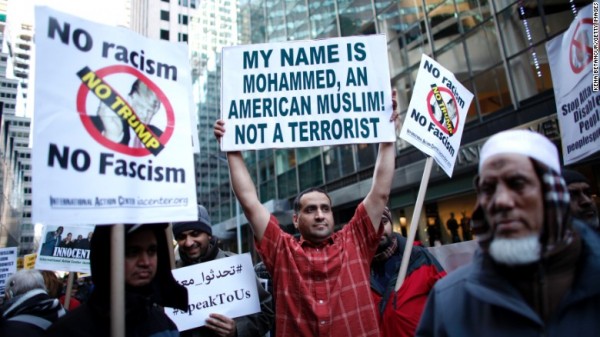
I first felt what it meant to be an outsider on a work trip to Israel. My headscarf marked me as a Muslim, and it
was clear some Israelis assumed I was an Arab, and by their logic, unwelcome. People pointed, stared, treated me rudely. Security checks at borders were longer and more intrusive ordeals for me than for my non-Muslim colleagues, and I grew frustrated and exhausted with constantly having to provide details on my family background and nationality to prove my identity.
But I told myself this was expected, especially during these tense times, and tried not to take it personally. (Does everyone tell themselves these sorts of things when they are profiled?) I just wanted to finish my work and leave as soon as possible for friendlier territory—East Jerusalem, the West Bank, Gaza, Jordan, and finally, America, my home. Sure enough, when I got off the plane in the US, I breathed a huge sigh of relief. No one at the airport, grocery store, or mall stared or treated me differently. I was American, the same as everyone else.
However, this was all before San Bernardino, before the alleged shooters were identified as Muslim, before Donald Trump’s call to ban Muslims from coming to America full stop, before the sudden spike in violence and threats against American Muslims. My Muslim friends and family worried about being harassed or attacked; some women I knew considered taking off their hijabs. It was overwhelming—Islamophobic incidents were already on the rise after the Paris attacks just a month earlier, but San Bernardino and its aftermath hit much closer to home.
What was perhaps most frightening of all was the sense that the need to prove myself had followed me from Israel to America. I had not changed, but all of a sudden my religion made me a target of suspicion. This is not my imagination, and the phenomenon is not limited to a few loud far-right voices. While he was careful to make the distinction between ISIS and Islam in a recent speech, even President Barack Obama stated that it was the “responsibility of Muslims around the world to root out misguided ideas that lead to radicalization.”
Imagine if Obama had replaced “Muslims around the world” with “white Americans” or “Christians” in reference to white supremacists like Dylan Roof, who killed nine people in a Charleston church this summer, or Robert Lewis Dear, a self-identifying Christian who killed three at a Planned Parenthood clinic in Colorado Springs just a few days before the San Bernardino tragedy. This would no doubt be met with widespread outrage. In fact, if you ask white Americans whether they should be held responsible for Dear’s actions, they emphatically disagree. They feel no need to root out white supremacist or radical Christian propaganda, and insist, correctly, that they’re separate from such extremists. So why isn’t the same courtesy extended to Muslims? Why is this associated blame so commonplace?
I entered the counterterrorism field because I felt a civic obligation as an American, not a religious one as a Muslim. And as someone who has written extensively about my experience as a Muslim American, the double standards are frustrating and, frankly, exhausting. It seems that nothing we say or do is enough, and the countless condemnations of terrorism by Muslims fall on deaf ears. Islamophobic rhetoric and attacks continue without consequence. It is now common for teachers to ask Muslim children (or those that “appear” Muslim) if they have bombs in their backpacks and for police to arrest and incarcerate them for days because a classmate joked about them having one. We are effectively being treated as outsiders in our own country.
Some Muslims have taken to social media to counter that sentiment through blogs, crowdsourced fundraisers, videos, and hashtag campaigns like #MuslimApartmentand #MuslimAmericanFaces. More power to those that have the energy and enthusiasm for this work, but how long will this be necessary? As Muslim Americans, we don’t have an obligation to prove, explain, or apologize for anything. Just as we accept that the overwhelming majority of Christians in this country are not all inclined to bomb abortion clinics in the name of Christianity, so should we assume the vast majority of Muslims are not terrorists hell-bent on killing non-Muslims.
I for one am done trying to convince people that I’m American and on their side. What could I possibly do or say that hasn’t already been done or said? It is time for the double standards, vitriolic rhetoric, and hate crimes against Muslims to end. Let us move forward as Americans and fight intolerance, discrimination and injustice together. Let us live.
Wardah Khalid is a writer, speaker, and analyst on Middle East policy and Islam in America. She is the author of the “Young American Muslim” blog for the Houston Chronicle, was previously Middle East policy analyst at the Friends Committee on National Legislation, and also worked as a countering violent extremism consultant.
VICE.COM

Leave a Reply
You must be logged in to post a comment.